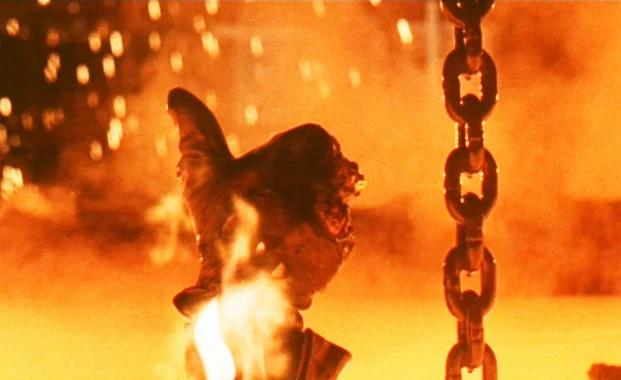 |
| Audrey Hepburn, James Garner, and Shirley MacLaine in The Children's Hour |
Cast: Audrey Hepburn, Shirley MacLaine, James Garner, Miriam Hopkins, Fay Bainter, Karen Balkin, Veronica Cartwright, Mimi Gibson, Debbie Moldow, Diane Mountford, William Mims, Sally Brophy, Hope Summers.
Screenplay: John Michael Hayes, Lillian Hellman,
based on a play by Hellman.
Cinematography: Franz Planer.
Art direction: Fernando Carrere.
Film editing: Robert Swink.
Music: Alex North.
Time has not been kind to Lillian Hellman's
The Children's Hour, either the play or the second film adaptation. It had been filmed once before, also under the direction of William Wyler, as
These Three, in 1936, only two years after it had become a Broadway sensation. At that time, the central accusation that the two schoolmistresses, Karen and Martha, were lesbians had to be changed to a heterosexual moral transgression -- that both were lovers of the same man, Dr. Joe Cardin. Despite this bowdlerization, there are many who think that the earlier movie is the better one, largely because it puts the emphasis on what Hellman said was the play's theme: "the power of a lie." In our contemporary climate, the idea that Karen and Martha might be lovers has much less power to shock, so that to our eyes, the furor that arises from a child's confused and devious accusation seems excessive. But perhaps more to the point is an artistic one: In today's LGBT community the idea that a work of fiction dealing with non-heterosexual relationships has to end in the death of one or more of its supposed transgressors has been labeled a "kill the queers syndrome." Even more recent films such as
Boys Don't Cry (Kimberly Peirce, 1999) and
Brokeback Mountain (Ang Lee, 2005), though praised for dealing candidly with transgender characters and gay relationships, have been faulted for too easily resolving their plots by having their central characters murdered by bigots.
The Children's Hour falls more blatantly into this trap with Martha's suicide, which seems not to come out of anything integral to the character but instead out of the need for a dramatic conclusion to the play and film. It's a film with good performances, though its actors sometimes have to struggle against their star personae. James Garner was so familiar as a smart aleck on the TV series
Maverick that he feels a little miscast as Dr. Cardin, Karen's fiancé, who is unable to convince her that he may indeed have believed in the rumor about her relationship with Martha. Audrey Hepburn, too, carries the aura of winsome romantic comedy heroine into her performance as Karen, but is more successful at overcoming the image. Of the three leads, Shirley MacLaine is the most successful, since she doesn't have to deal with a too-precisely established screen persona, and she brings real depth to Martha's conflicts, including her simmering resentment of Karen's supposed abandonment of their plans in order to marry Joe, and her anguished recognition of her possibly repressed lesbianism. But the real standouts in the cast are the supporting players, Miriam Hopkins (who had played Martha in
These Three) as the flibbertigibbet Aunt Lily and Fay Bainter, Oscar-nominated for her role as Amelia Tilford, whose credulity when her niece tells her the lie about Karen and Martha brings about the crisis. Wyler's direction is, as always, precise and professional, and the art direction of Fernando Carrere and the cinematography of Franz Planer make the primary setting, the girls school, follow the film's changes in mood, from innocent to grim.




























